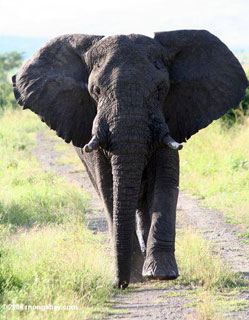New Chili Sauce Promotes Elephant Consevation
New Chili Sauce Promotes Elephant Consevation
Wildlife Conservation Society
July 25, 2006
New Chili Sauce: Some Like it Hot Elephants Don’t
Now Available in U.S., Hot Sauce Products Protect Elephants, Support Farmers
First there was dolphin-safe tuna, then came fair-trade coffee. Now, hot sauce lovers can get into the act with a line of “Elephant Pepper” chili products that help protect elephants in southern Africa, and are available in the United States for the first time, according to the Wildlife Conservation Society (WCS).
Elephant Pepper produces high quality, delicious, and uniquely African chili products—Zambezi Red, Baobab Gold, Chili Jam and Chili Relish. With the production of these sauces, Elephant Pepper seeks to create new economic opportunities for rural Africans and support efforts to safely reduce the conflict between elephants and humans in Africa. The project brings sustainable financial, social, and environmental benefit to its stakeholders by linking African farmers to a global marketplace and raising awareness around successful approaches to elephant conservation.
 Adult elephant in Uganda. Photo by R. Butler
When elephants attack. Surviving an elephant charge in the Congo rainforest of Gabon The elephant charges. The ground trembles. Hearts racing, we are now sprinting through the forest dodging vegetation as the elephant plows right through it. The problem with being chased by an elephant, aside from their obvious size advantage, is they can run faster than you. While wild elephants can be dangerous animals under the right circumstances, other creatures are responsible for more deaths in Africa. Topping the list is the hippo, whose penchant for capsizing canoes that come too close results in the dumping of passengers who often can’t swim. Buffalo, crocodiles, and lions are directly responsible for more deaths and injuries.
What do hot sauce aficionados and African elephants have in common? They both feel the burn of chilli peppers, the key ingredient for resolving human-elephant conflicts in Africa while raising money for farmers and conservation. Supported by the Wildlife Conservation Society (WCS) and other groups, the Elephant Pepper Development Trust (EPDT) has not only promoted the use of chilli peppers as a means of keeping elephants, buffalo, and other species away from important sources of human food, but has also introduced a viable cash crop to the economy of African nations. |
“Chili peppers give farmers an economically feasible means of keeping elephants away from valuable crops through non-lethal methods,” said Loki Osborn, project director for the Elephant Pepper Development Trust, a project supported by WCS. “The chilies grown by the farmers are used to make great hot sauce products, all of which are now available in the United States.”
Osborn originated the idea of Elephant Pepper in 1997, when he found that chili peppers could be used as a means of stopping elephants from destroying crops in the Zambezi Valley, which straddles the borders of Zimbabwe and Zambia. While electric fences and other deterrents are prohibitively expensive, chilies provide farmers with a cost-effective means of warding off the elephants without inflicting them with permanent damage.
Specifically, elephants do not like capsaicin—the chemical in chili which makes them hot. Farmers use chili peppers to deter potential crop raiders in three ways: as a protective buffer crop to surround core crops of maize, sorghum and millet; by mixing crushed chilies with used grease, which the farmers apply to simple string fences; and by mixing crushed chili with animal dung to make briquettes which they burn at night, creating a noxious smoke to keep elephants out. The chilies are then harvested and sold to the Elephant Pepper brand for hot sauce products, which are marketed in South Africa, Zambia, Botswana, and now the United States. Proceeds from the sales of those products are then donated to the trust to support to the development of more chili growing projects.
“The response by the American public to our product has been overwhelming,” explained Marketing Manager Nina Gibson. “Still our major challenge is to identify a distributor who would like to get involved with this socially responsible brand, and contribute to economic development in Africa. The brand needs a partner who will see the long term benefit of the project.”
“This is a great example of how conservation and development can be successfully combined into a win-win situation,” said Dr. James Deutsch, director of WCS’ Africa Program. “The Elephant Pepper product line now offers U.S. consumers a means of supporting both elephants and sustainable development in Africa.”
The U.S. launch initiative is supported by USAID-Market Access Trade and Policies and the AGOA-Southern Africa Global Competitiveness Hub. The American public can support the project by buying sauces on www.elephantpepper.com or donate to the project on www.wcs.org/elephantpepper.
This is a modified news release from the Wildlife Conservation Society.













